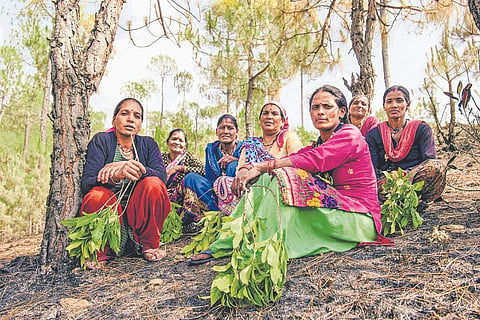
- LIFESTYLE
- FASHION
- FOOD
- ENTERTAINMENT
- EVENTS
- CULTURE
- VIDEOS
- WEB STORIES
- GALLERIES
- GADGETS
- CAR & BIKE
- SOCIETY
- TRAVEL
- NORTH EAST
- INDULGE CONNECT

There is no denying that the earth we live in is in need of our attention — to preserve and protect it. As climate crisis looms large, it is high time we engage in conversations to discuss what best we can do, in our individual capacity, to undo the damage we have done. The damage is greater than any effort we put in no doubt, but every effort is worth the try to at least initiate a process of change. Encouraging the same, on World Environment Day Alliance Française of Madras in collaboration with Environmentalist Foundation of India (EFI) is presenting Environment Day Conversation through the medium of story-telling, which will be followed by a short documentary series, Faces of Climate Resilience by the Council on Energy, Environment and Water in partnership with India Climate Collaborative, Edelgive Foundation and
Drokpa Films.
Arun Krishnamurthy, founder of Environmentalist Foundation of India, will be the narrator for the story-telling session, which will have ‘water’ as the main theme. “Water as a resource should be the talk of the hour; as we keep progressing and developing, we tend to forget our roots to our natural resources. We would narrate a water story and then try to connect with the audience about their stories related to water,” Arun says, adding, “Through the story-telling session, EFI wants to motivate people to understand the need for conserving our natural habitats. We are hoping that our conversation leads to conservation.”
Faces of Climate Resilience captures the voices of climate vulnerable populations in 16 stories from five Indian states. The project strives to make climate change more tangible through the lived experiences of people. The focus is on how individuals and communities are responding to the climate crisis. They are embracing nature-based solutions and traditional wisdom. They are mobilising collective action and collaborating with non-profit organisations and local government officials to build climate resilience.
Directed by Shawn Sebastian, the docu series captured stories from Kerala, Maharashtra, Odisha, Rajasthan and Uttarakhand over nine months in 2021-22. The stories include a women’s collective in Odisha replanting trees along a cyclone-prone coast; a mahila mangal dal (women’s group) in Uttarakhand working with local forest officials in combating forest fires; and a youth group in suburban Mumbai sensitising slum dwellers about climate change and more.
We also speak to Milan Jacob, communications specialist, Council on Energy, Environment and Water and creative producer, Faces of Climate Resilience (FCR) to know more about this docu series. He tells us, “The film is aimed to make climate change mainstream and data on climate risks more relatable through human-centric stories. Through the film, we have highlighted success stories of climate adaptation at India’s grassroots, deviating from the typical doom and gloom narrative around climate change. The docu series were also conceived as conversation starters on climate and sustainability in the run-up to COP27 in Egypt.”
Sharing about the concept, he adds, “The idea behind FCR came from the CEEW’s research on climate risks. For instance, eight out of 10 Indians live in districts vulnerable to cyclones, floods, droughts and their associated events, according to CEEW analysis. The films helped to ground truth, the underlying data while also highlighting efforts at India’s grassroots to combat climate change and build resilience.”
Faces of Climate Resilience was screened at educational institutions, cultural spaces and corporate offices in more than 10 Indian and international cities. It was also screened at the UNFCCC GST creative space at COP27. The film has helped to humanise a complex issue like climate change and made it more relatable to the lay audience. It has won the Excellence Award at Docs Without Borders International Film Festival (United States) and Best Documentary Runner-up at Aravali International Film Festival (India).
Open to all.
June 5. 6 pm.
At Alliance Française of Madras.
rupam@newindianexpress.com
@rupsjain
Abhinava Dance Company presents a reprised version of their popular production Rama Katha Vismaya
Explore Vintage Voyage at BITM
Nonagenarian Cuban singer Omara Portundo gears up for her first performance in India
Rajashri Bag comes out with a Hindi single, Benaam ishq
Ananya Birla launches English single 'Caught Up'